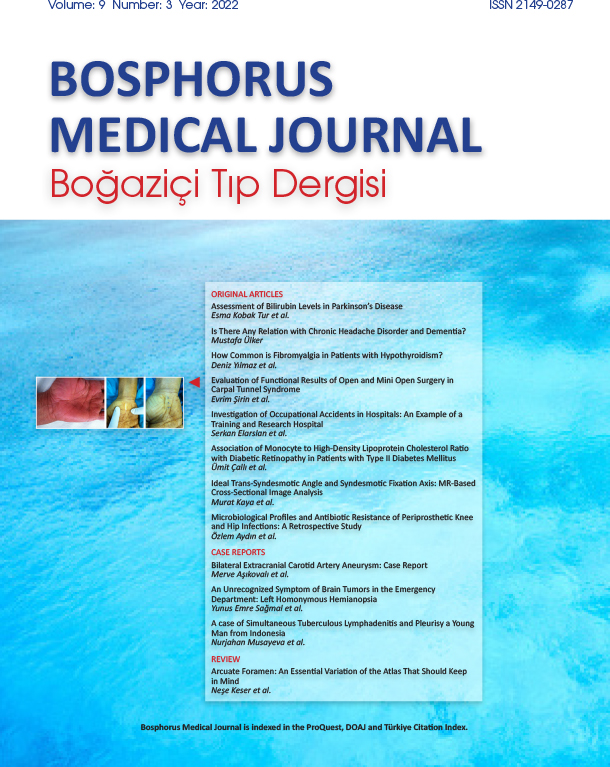Perception of Male Nurse in Turkish society: The Case of Istanbul Province
Selma Dağcı1, Ayşegül Beyazpınar Kavaklıoğlu2, Volkan Kızılay1, Serkan Elarslan3, Latife Nadire Demirci4, Yaşar Sertbaş3, Kamil Özdil11Department of Gastroenterology, Health Sciences University, Umraniye Training and Research Hospital, İstanbul, Türkiye2Department of Oncology, Balıkesir Ataturk City Hospital, Balıkesir, Türkiye
3Department of Internal Medicine, Health Sciences University Fatih Sultan Mehmet Training and Research Hospital, İstanbul, Türkiye
4Department of Medical Imaging Techniques, Halic University, İstanbul, Türkiye
INTRODUCTION: This study was carried out to determine the male nurse perception of the patients.
METHODS: The study was carried out with 521 patients who applied to a training and research hospital and agreed to participate in the study. In the study, a sociodemographic characteristics questionnaire and a 3-point Likert-type proposition form consisting of 16 items were used, which was created by the researchers in line with the literature and to determine their views on the perception of male nurses.
RESULTS: About 30.7% of the cases were between the ages of 30 years and under, 63.1% were women, 27.3% were primary school graduates, and 33.4% were housewives. It was determined that the cases wanted to receive care from nurses of their own gender when they were hospitalized (p=0.001) and were embarrassed, hesitant, and surprised when they received care from a nurse who was not their same gender (p=0.001). It was determined that patients whose family members were health professionals could approve male nurses to work in every service in the hospital environment without discrimination and for their daughters to choose the nursing profession (p=0.028). It was determined that patients whose family members were not health-care professionals thought that men would not make a difference in the nursing profession (p=0.025).
DISCUSSION AND CONCLUSION: When the findings obtained from our study were evaluated, it was determined that the nursing profession was not gender specific, male nurses were accepted to work in all fields, but the patients wanted to receive care from their fellow nurses. In this context, public awareness should be raised that gender does not affect the quality of nursing care.
Keywords: Attitude, care, gender, male nurse, perspective.
Türk Toplumunda Erkek Hemşire Algısı: İstanbul İli Örneği
Selma Dağcı1, Ayşegül Beyazpınar Kavaklıoğlu2, Volkan Kızılay1, Serkan Elarslan3, Latife Nadire Demirci4, Yaşar Sertbaş3, Kamil Özdil11İstanbul Medeniyet Üniversitesi, Tıp Fakültesi, Genel Cerrahi Anabilim Dalı, Göztepe Prof. Dr. Süleyman Yalçın Şehir Hastanesi, İstanbul, Türkiye2Balıkesir Atatürk Şehir Hastanesi, Onkoloji Bölümü, Balıkesir, Türkiye
3Sağlık Bilimleri Üniversitesi Fatih Sultan Mehmet Eğitim ve Araştırma Hastanesi, İç Hastalıkları Kliniği, İstanbul, Türkiye
4Haliç Üniversitesi, Tıbbi Görüntüleme Teknikleri Bölümü, İstanbul, Türkiye
GİRİŞ ve AMAÇ: Bu çalışma, hastaların erkek hemşire algısını belirlemek amacıyla yapıldı.
YÖNTEM ve GEREÇLER: Çalışma, bir eğitim ve araştırma hastanesine başvuran ve araştırmaya katılmayı kabul eden 521 hasta ile yapıldı. Çalışmada, sosyodemografik özellikler soru formu ile araştırmacılar tarafından literatür doğrultusunda oluşturulan ve hastaların erkek hemşire algısına ilişkin görüşlerini belirlemeye yönelik 3lü likert tipinde 16 maddeden oluşan önerme formu kullanıldı.
BULGULAR: Olguların %30,7si 30 yaş ve altında, %63,1i kadın, %27,3ü ilköğretim mezunu ve %33,4ü ev hanımı idi. Olguların hastanede yatarak tedavi gördüklerinde kendi cinsiyetlerinde hemşirelerden bakım almak istedikleri (p=0,001), hemcinsleri olmayan hemşireden bakım aldıklarında ise utandıkları, çekindikleri ve şaşırdıkları tespit edildi (p=0,001). Aile üyelerinde sağlık profesyoneli olan hastaların erkek hemşirelerin hastane ortamında ayrım yapılmaksızın her serviste çalışmasını ve kızlarının hemşirelik mesleğini seçmesini onaylayabilecekleri saptandı (p=0,028). Aile üyelerinde sağlık profesyoneli olmayan hastaların ise, erkeklerin hemşirelik mesleğinde bir değişiklik yaratmayacağı düşüncesine sahip oldukları belirlendi (p=0,025).
TARTIŞMA ve SONUÇ: Çalışmamızdan elde edilen bulgular değerlendirildiğinde, hemşirelik mesleğinin cinsiyete özgü olmadığı, erkek hemşirelerin tüm alanlarda çalışmasının kabul gördüğü ancak hastaların kendi hemcinsleri olan hemşirelerden bakım almak istedikleri belirlendi. Bu kapsamda cinsiyetin, hemşirelik bakımının kalitesini etkilemediği konusunda toplumun bilinçlendirilmesi sağlanmalıdır.
Anahtar Kelimeler: Erkek hemşire, bakım, tutum, cinsiyet, bakış açısı.
Manuscript Language: Turkish




















